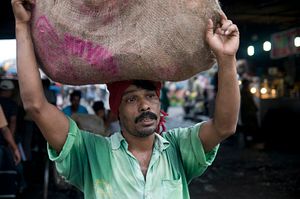Conveniently located near the Sealdah station in Central Kolkata, Kolay market is the largest wholesale market of the city catering to the daily needs of thousands of the city’s residents. Chock-a-block with buyers and sellers, the narrow lanes are always congested and slippery with rotting vegetables. The dark alleyways always smell of fresh and rotting seasonal greens, and the strong odor of spices and chili peppers makes those corridors almost unbearable to the casual passerby.
Moving in and out of this chaotic set up is a group of well-built men carrying impossibly huge loads of vegetables. They are migrant workers from Bihar, the neighboring state, and they are the human forklifts of Kolay market. Working as daily laborers, they get to work as soon as the trucks with bushels of vegetables arrive on the roads beside the market and bundle 80-100 kilograms (176 to 220 pounds) of vegetables on their turban-wrapped heads before carrying them to the wholesalers inside the market. Each laborer works 10 to 12 hours per day and earns about INR 300 to 500 ($5 to 8.50) for the grueling work.
These men are prone to degenerative diseases, with severe damage to their spinal cords and central nervous system from the years of herculean work. Most of them retire to their villages before they reach 40.
Kolay market remains open 24/7 and is one of the few places in Kolkata that does not shut down even when a strike paralyzes other parts of the city. The human forklifts of this market work on a “no work, no pay” basis.
Sugato Mukherjee is a photographer and writer based in Calcutta and his works have appeared in The Globe and Mail, Al Jazeera, National Geographic Traveler, Harper Collins and Yale University Journal. His coffee table book on Ladakh has been published from Delhi in 2013. Some of his visuals and stories can be found at sugatomukherjee.com












































